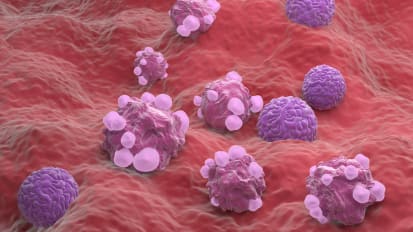Search Videos and More
 News
News
Seeking Signs of Synergy: The Origins of PARP and PI3K Inhibitors
Pairing multiple drugs together to synergistically destroy a patient's tumor has become a common approach to cancer treatment News
News
Therapy for Small, HER2-positive Breast Tumors Continues to Be Highly Effective After 10 Years, Study Finds
Follow-up results of a clinical trial that defined the standard treatment for patients with small, HER2-positive breast cancer that hasn't spread to the lymph nodes reinforce the long-term effectiveness of the therapy. News
News
Dana-Farber Research Supports FDA Approval of New Therapy for Certain Patients with Ovarian Cancer
A novel antibody drug conjugate therapy whose clinical trial testing has been co-led by Ursula Matulonis, MD, of the Dana-Farber Cancer Institute has been granted accelerated approval by the U.S. Food and Drug Administration (FDA) on November 14 for the treatment of recurrent platinum-resistant high-grade serous ovarian cancer that highly expresses folate receptor alpha. News
News
Advancing New Treatments for Uncommon Cancer Subtypes
The biology of rare cancers is poorly understood in part because the tumors are uncommon, which makes them challenging to study. Clinical trials examining rare cancers are difficult. News
News
Combination Therapy Produces Encouraging Results in Patients with Gynecologic Cancers with Distinct Genetic Mutations
A two-drug therapy that sets certain cancer cells up for failure and then finishes them off showed encouraging activity in a clinical trial of patients with gynecologic cancers that harbor mutations in a key gene, Dana-Farber investigators reported at the Society for Gynecologic Oncology (SGO) Annual Meeting in March. Symposium
Symposium
2022 SGO Highlights
DFCI Faculty share highlights from the Society of Gynecologic Oncology Annual Meeting on Women's Cancers held on March 18-21, 2022, in Phoenix, AZ and online. Video
Video
Ursula Matulonis, MD Shares Results of the SORAYA Study
Ursula Matulonis, MD presented results of the SORAYA study at the 2022 Society for Gynecologic Oncology Annual Meeting. Video
Video
Panos Konstantinopoulos, MD, PhD Shares Results of a Phase 2 Endometrial Cancer Study at 2022 SGO
Panos Konstantinopoulos, MD, PhD shares results of a phase 2, two-stage study of letrozole and abemaciclib in estrogen receptor (ER) positive recurrent or persistent endometrial cancer at the 2022 Society for Gynecologic Oncology Annual Meeting. News
News
Conjugate Therapy Produces Remissions in One-Third of Patients with Drug-Resistant Ovarian Cancer, Study Results Show
In a clinical trial involving patients with ovarian cancer previously treated with platinum-based chemotherapy, a novel “conjugate” therapy produced a substantially better response than standard treatments. Results from this study were presented by Dana-Farber's Ursula Matulonis, MD during a plenary session at the SGO 2022 Annual Meeting. News
News
Drug Combination Shows Effectiveness in Patients with Recurrent ER-Positive Endometrial Cancer
A combination therapy that targets cancer cells from within and without caused tumors to shrink or stabilize in 75% of patients with recurrent or persistent estrogen receptor- (ER-) positive endometrial cancer. Results from this trial were shared by Panos Konstantinopolous, MD, PhD during a plenary session at the SGO 2022 Annual Meeting. News
News
Implantable Device Helps Predict Drug Therapy Efficacy
Dana-Farber investigators recently launched a trial of a miniature device that can be implanted into ovarian tumors to deliver microdoses of different drugs, with the goal of rapidly measuring their effectiveness in killing cancer cells. News
News
Genetic Signature of Tumor Cells Predicts Response to Chemotherapy Drug for Patients with Form of Ovarian Cancer
For more than two decades, the chemotherapy drug gemcitabine has been a mainstay treatment for several types of cancer, producing remissions in many patients on its own or conjunction with other drugs. Now, scientists at Dana-Farber Cancer Institute have uncovered, for the first time, genetic evidence of which patients with high-grade serous ovarian cancer (HGSOC) are likely to benefit from the drug.